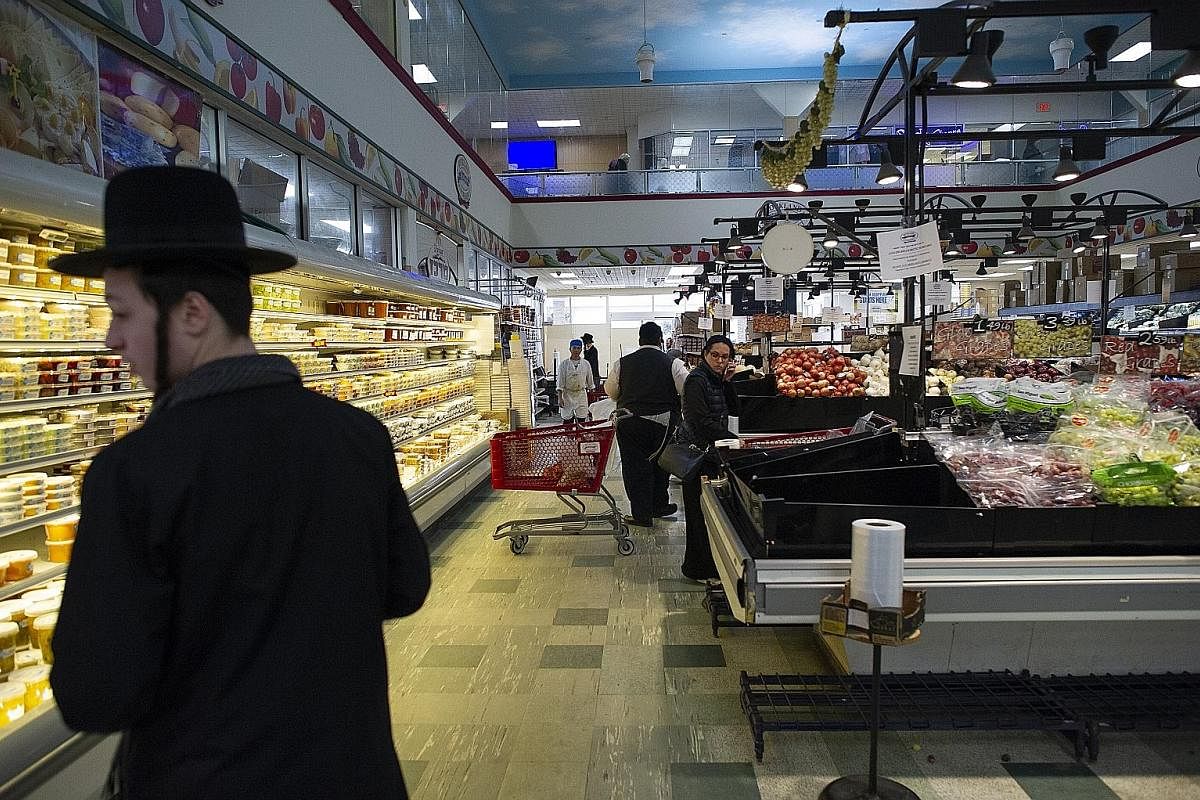Measles outbreak spreads fear
Measles cases highlight tensions in New York county facing influx of ultra-Orthodox Jews

SPRING VALLEY (New York) • Ms Erica Wingate was working at a clothing store in town last week when a shopper, with the black hat and sidelocks typically worn by ultra-Orthodox Jews, started coughing.
Another customer standing next to him suddenly dropped the item she had been holding and clutched her child.
"She was buying something, and she just threw it down," Ms Wingate recalled. "She said, 'Let's go, let's go! Jews don't have shots!'"
A measles outbreak in this suburban New York county has sickened scores of people and alarmed public health experts who fear it may be a harbinger of the growing influence of the anti-vaccine movement.
But it has also intensified long-smouldering tensions between the county's rapidly expanding and insular ultra-Orthodox Jewish community and secular society.
The authorities in Rockland County have traced the spread of measles to ultra-Orthodox families whose children have not been vaccinated. And so some residents say they now wipe public bus seats and cross the street when they see ultra-Orthodox Jews.
Hasidic leaders said they feared not only a rise in anti-Semitism but also an invasion of their cloistered community by the authorities under the guise of public health.
Last Tuesday, county officials took the extraordinary step of announcing a state of emergency, barring unvaccinated children under 18 from public places, including restaurants, shopping centres, houses of worship and schools.
The emergency order has emerged as a flashpoint in a continuing clash in Rockland County, a collection of five towns north-west of New York City with a total population of more than 300,000 people.
About 31 per cent of the population is Jewish, according to the state, and includes one of the largest concentrations of ultra-Orthodox Jews in the United States. The surge in the ultra-Orthodox population has been driven in part by Hasidic families from Queens and Brooklyn, where there have also been outbreaks.
Some suburbanites are concerned about the changes to their neighbourhoods caused by new enclaves of high-density developments intended to accommodate the often large size of Hasidic families. In some places, the influx has upended the housing market, causing some non-Orthodox buyers to seek homes elsewhere. But while those tensions were once buffered by yeshiva walls and eruvim, the symbolic perimeters around Hasidic enclaves, the outbreak of measles, which is highly contagious, cannot be kept to such boundaries.
"I think that for the most part people have been just annoyed - in certain parts of the county you can't buy a house or can't sell your house," said Ms Jessica Finnegan, 32, who was pushing her eight-month-old son, Kieran, in his stroller through a Target store in Spring Valley.
The store had been previously identified by officials as one place where people may have been exposed to measles. The outbreak of the disease began in October.
Ms Finnegan had Kieran immunised six months earlier than the recommended age because of the outbreak, she said. "But now they are affecting us, which I think could get nasty."
Still, she said she feared the emergency measure would spur a backlash against her Orthodox friends and neighbours.
"I think this could really start something," she said. "What if someone decided to take this into their own hands?"
Ever since the public health declaration, Mr Aron Wieder, a legislator in Rockland County and a prominent member of the Hasidic community, has fielded non-stop phone calls from fellow Hasidim fearful of being vilified, he said.
"The conception that is out there is completely distorted, and that is that the Orthodox community for the most part don't vaccinate their children, and that is not true," Mr Wieder added. "The county executive had a moral obligation to point these things out."
An unfounded fear of vaccines has spread around the world in recent years, with childhood vaccination rates reportedly declining in several countries as a result.
Nothing in the belief system of Orthodox Jews makes them any more likely to oppose vaccines, and several Orthodox rabbinical organisations have called on parents to vaccinate their children. But Hasidic Jews are prey to the same misinformation that has affected others, and some ultra-Orthodox rabbis have come out against vaccines.
Mr John Lyon, a spokesman for Rockland County, said there would not be any active enforcement of the emergency rule.
"There won't be police officers on the corner standing outside of grocery stores," he said. "Nobody's going to ask anyone to see their vaccination records or medical history."
Instead, he said, the order was intended as an incentive for people both to vaccinate their children and to cooperate with the health department's efforts to trace and contain the outbreak.
But, Mr Lyon added, if health officials tracing a new measles case discovered that unvaccinated minors had contracted or spread the measles because they went to a public place, their parents could face penalties.
Fault lines have appeared within the Orthodox community, where its leadership has been struggling not only to push those who fail to immunise their children to get vaccinations, but against the false perception that Hasidim as a whole are against vaccination.
"You have fanatics in every group," said Mr Avi Kagan, an accountant who is Hasidic, and who like others stressed that there is no religious edict against vaccination.
In fact, he feels his faith demands the opposite: "The only way to serve God," Mr Kagan said, "is to be alive".
NYTIMES
Join ST's Telegram channel and get the latest breaking news delivered to you.
A version of this article appeared in the print edition of The Sunday Times on March 31, 2019, with the headline Measles outbreak spreads fear. Subscribe
